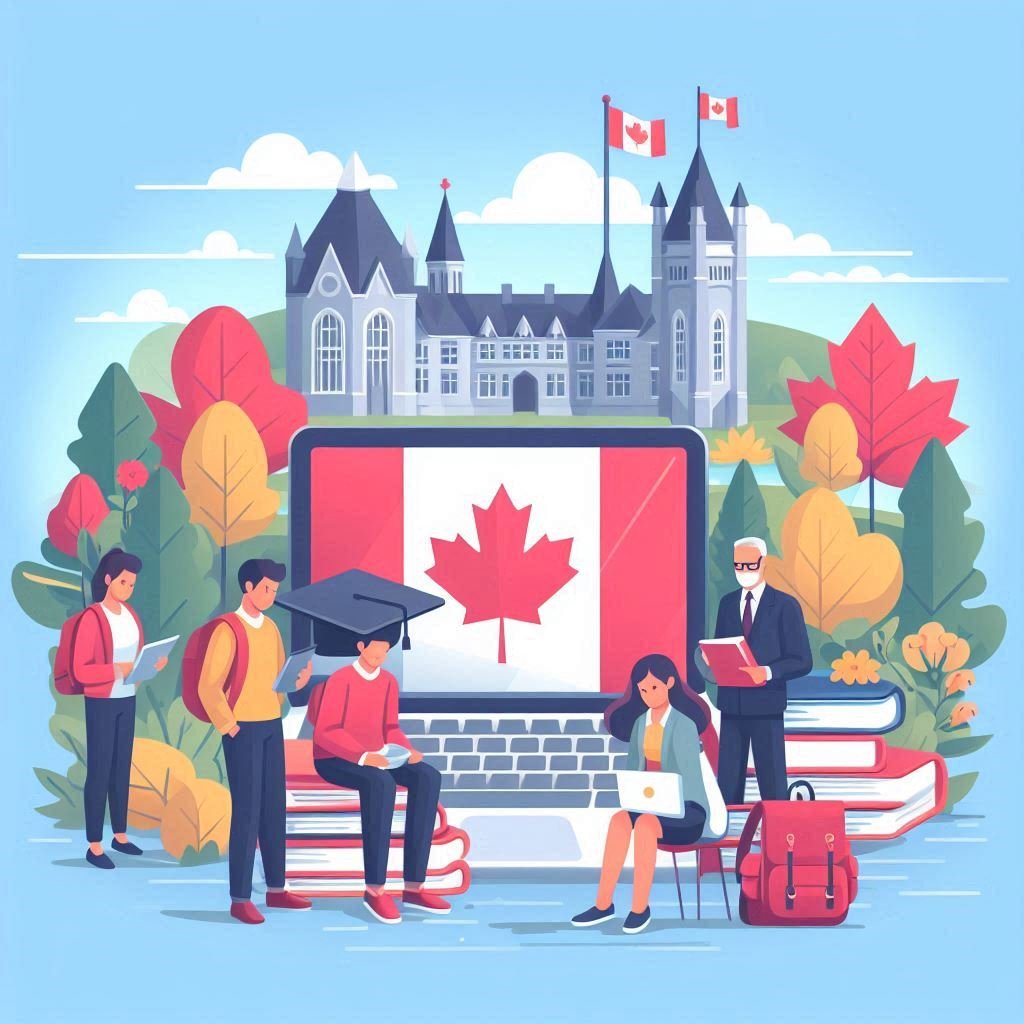Introduction
Embarking on an educational journey in Canada is an exciting prospect for international students worldwide. Known for its high-quality education, diverse culture, and welcoming atmosphere, Canada has become a top destination for those seeking to broaden their horizons through academic pursuits. However, navigating the intricacies of the student visa process can be daunting. This comprehensive guide aims to demystify the Canada student visa application process, providing you with all the information you need to turn your dream of studying in Canada into a reality.
Understanding the Canada Student Visa
What is a Canada Student Visa?
A Canada student visa, officially known as a study permit, is a document issued by the Canadian government that allows foreign nationals to study at designated learning institutions (DLIs) in Canada. It’s crucial to understand that a study permit is not a visa itself but is typically issued alongside a visitor visa or an electronic travel authorization (eTA).
Types of Study Permits
Canada offers different types of study permits based on the duration and nature of your study program:
- Short-term studies (6 months or less): In some cases, you may not need a study permit for short courses or programs.
- Long-term studies (more than 6 months): This requires a full study permit.
- Post-graduation work permit: This allows students to work in Canada after completing their studies.
Eligibility Criteria for a Canada Student Visa
To be eligible for a Canada student visa, you must meet several requirements:
1. Acceptance at a Designated Learning Institution (DLI)
You must have been accepted by a school, college, university, or other educational institution in Canada that is on the list of DLIs. This acceptance is crucial as it forms the foundation of your study permit application.
2. Proof of Financial Support
One of the most critical aspects of your application is demonstrating that you have enough funds to support yourself during your stay in Canada. This includes:
- Tuition fees
- Living expenses for yourself and any family members accompanying you
- Return transportation costs
As of 2023, you need to prove that you have at least CAD 10,000 per year (or CAD 11,000 if studying in Quebec) for living expenses, in addition to your tuition fees.
3. Clean Criminal Record
You must have no criminal record and may need to provide a police clearance certificate. This requirement ensures that you do not pose a security risk to Canada.
4. Good Health
You might be required to undergo a medical examination as part of your application process. This is to ensure that you’re in good health and don’t have any conditions that could pose a risk to public health in Canada.
5. Intent to Leave
You must convince the immigration officer that you will leave Canada at the end of your authorized stay. This doesn’t mean you can’t consider options to stay in Canada after your studies, but for the purpose of your study permit, you should demonstrate ties to your home country.
6. Language Proficiency
Depending on your program, you may need to prove your proficiency in English or French. Common tests accepted include:
- IELTS (International English Language Testing System)
- TOEFL (Test of English as a Foreign Language)
- Canadian Academic English Language (CAEL) Assessment
- TEF (Test d’évaluation de français)
The Application Process
Step 1: Get Accepted to a Designated Learning Institution
Before you can apply for a study permit, you need an acceptance letter from a DLI. Here’s how to go about it:
- Research Canadian institutions and programs that interest you.
- Check the admission requirements for your chosen program.
- Prepare your application documents, which may include:
- Transcripts from previous educational institutions
- Standardized test scores (e.g., SAT, GRE, GMAT)
- Letters of recommendation
- Statement of purpose
- Proof of language proficiency
- Submit your application before the deadline.
- Wait for the institution’s decision.
Once accepted, you’ll receive an acceptance letter, which is crucial for your study permit application.
Step 2: Check if You Need a Study Permit
While most international students need a study permit, there are exceptions. You may not need a study permit if:
- Your course or program is six months or less
- You’re a family or staff member of a foreign representative in Canada
- You’re a member of a foreign armed force under the Visiting Forces Act
Always check the official guidelines to confirm whether you need a study permit.
Step 3: Prepare Your Documents
Gathering all necessary documents is a crucial step in the application process. Here’s a comprehensive list of what you’ll typically need:
- Valid passport: Ensure your passport is valid for the duration of your intended stay in Canada.
- Proof of acceptance from a DLI: This is the official letter of acceptance from your chosen Canadian institution.
- Proof of funds: This can include:
- Bank statements
- Proof of a Canadian bank account in your name if you’ve transferred money to Canada
- Proof of a student/education loan
- Your bank’s letter
- Proof of paid tuition and housing fees
- Proof of funding from within Canada if you have a scholarship or are in a Canadian-funded educational program
- Passport-sized photographs: Follow the specifications provided by the Canadian government.
- Immigration medical examination results: If required, you’ll need to undergo a medical exam with an approved panel physician.
- English or French language proficiency test results: As mentioned earlier, this could be IELTS, TOEFL, CAEL, or TEF scores.
- Statement of purpose: A letter explaining why you want to study in Canada, your chosen program, and how it fits into your career plans.
- Curriculum vitae (CV): A detailed resume of your academic and professional experiences.
- Letter of explanation: If there are any unusual aspects to your application, explain them here.
- Additional documents: Depending on your country of origin or personal circumstances, you may need to provide:
- A custodian declaration (if you’re a minor)
- A Québec Acceptance Certificate (if you’re planning to study in Québec)
- An Electronic Travel Authorization (eTA) or visitor visa
Step 4: Submit Your Application
You can apply for a study permit online or on paper. Online applications are usually processed faster and are the recommended method. Here’s how to apply online:
- Create an account on the Government of Canada website
- Fill out the application form accurately and completely
- Pay the required fees (as of 2023, the study permit fee is CAD 150)
- Upload all necessary documents
When filling out your application, be honest and provide as much detail as possible. Any discrepancies or omissions could lead to your application being rejected.
Step 5: Wait for Processing
Processing times vary depending on your country of origin and the completeness of your application. As of 2023, processing times can range from 2 to 16 weeks. You can check estimated processing times on the IRCC website.
During this time, avoid making any non-refundable travel arrangements. The Canadian government may also request additional documents or information, so keep an eye on your email and application status.
Step 6: Respond to Additional Requests
If the immigration office needs more information or documents, they will contact you. It’s crucial to respond promptly to avoid delays in processing your application. Common additional requests might include:
- Biometrics (fingerprints and photo)
- Additional financial documents
- Updated language test results
- Medical exam results
Step 7: Prepare for Arrival
If your application is approved, you’ll receive a port of entry (POE) letter of introduction. This is not your study permit, but you’ll present it to the border services officer when you arrive in Canada to receive your actual study permit.
Before you travel:
- Check your POE letter for accuracy
- Ensure you have all necessary documents in your carry-on luggage
- Prepare for your arrival by researching Canadian customs regulations
- Arrange your accommodation and transportation from the airport
Life as an International Student in Canada
Cultural Adjustment
Canada is known for its multiculturalism, but you may still experience culture shock. Here are some tips to help you adjust:
- Participate in orientation programs offered by your institution
- Join student clubs and organizations
- Explore your new city and surrounding areas
- Be open to trying new foods and experiences
- Stay connected with your home culture while embracing Canadian culture
Academic System
The Canadian education system may differ from what you’re used to. Here are some key aspects to be aware of:
- Grading systems: Most Canadian institutions use a percentage system or a 4.0 GPA scale.
- Class participation: Active participation in class discussions is often encouraged and may be part of your grade.
- Academic integrity: Plagiarism and cheating are taken very seriously. Always cite your sources and do your own work.
- Course structure: Courses often include a mix of lectures, tutorials, and labs.
- Assignments and exams: Expect a combination of essays, projects, presentations, and exams throughout the semester.
Weather
Canada experiences four distinct seasons, with winters being particularly cold in many regions. Be prepared for:
- Hot summers (June to August)
- Colorful autumns (September to November)
- Cold winters with snow in many areas (December to March)
- Mild springs (April to May)
Invest in appropriate clothing, especially warm winter gear like a good coat, boots, gloves, and a hat.
Transportation
Major cities in Canada have efficient public transportation systems. As a student, you may be eligible for discounted transit passes. In smaller towns, you might need to rely more on walking, cycling, or even driving. If you plan to drive, check the requirements for an international driver’s license in your province.
Health Insurance
Most provinces in Canada don’t cover international students under their provincial health care plans. You’ll need to arrange private health insurance. Many universities offer health insurance plans for international students, or you can purchase coverage from private insurance companies.
Banking
You’ll need to open a Canadian bank account. Research banks that offer student accounts with favorable terms. Popular banks for international students include:
To open an account, you’ll typically need:
- Your passport
- Study permit
- Proof of address in Canada
- Student ID or acceptance letter from your institution
Part-Time Work
As an international student, you may be eligible to work part-time during your studies. Most study permits allow you to work up to 20 hours per week during regular academic sessions and full-time during scheduled breaks. This can be a great way to gain Canadian work experience and supplement your income.
To work off-campus, you must:
- Have a valid study permit
- Be a full-time student
- Be enrolled at a designated learning institution at the post-secondary level
- Be studying in an academic, vocational or professional training program that leads to a degree, diploma or certificate that is at least six months in duration
Post-Graduation Opportunities
Post-Graduation Work Permit (PGWP)
After completing your studies, you may be eligible for a Post-Graduation Work Permit, allowing you to work in Canada for up to three years. The PGWP is an excellent opportunity to gain Canadian work experience, which can be valuable if you’re considering applying for permanent residency.
To be eligible for a PGWP, you must:
- Have completed a full-time study program of at least 8 months at a DLI
- Apply within 180 days of receiving written confirmation that you’ve completed your study program
- Have a valid study permit when you apply
Express Entry
The Express Entry system is a popular route for skilled immigrants to become permanent residents. Your Canadian education and work experience can give you a significant advantage in this process. The system manages applications for three federal economic immigration programs:
- Federal Skilled Worker Program
- Federal Skilled Trades Program
- Canadian Experience Class
To apply through Express Entry, you’ll need to:
- Create an online profile
- Enter the Express Entry pool
- Receive an Invitation to Apply if you meet the criteria
- Submit your application for permanent residence
Frequently Asked Questions
Q: How long does it take to process a Canada study permit?
A: Processing times vary but typically range from 2 to 16 weeks, depending on your country of origin and the completeness of your application.
Q: Can I extend my study permit?
A: Yes, you can apply to extend your study permit if you want to continue your studies or change programs. Apply at least 30 days before your current permit expires.
Q: Can my family members come with me to Canada?
A: Yes, you can include your spouse and dependent children in your application, or they can apply separately for a visitor visa or work permit.
Q: Can I work off-campus with a study permit?
A: Most study permits allow you to work up to 20 hours per week off-campus during regular academic sessions and full-time during scheduled breaks.
Q: What happens if my study permit application is refused?
A: If your application is refused, you’ll receive a letter explaining why. You may be able to appeal the decision or reapply with additional information.
Q: Can I change my program or institution after arriving in Canada?
A: Yes, but you may need to apply for a new study permit if your program length changes or if you change your Designated Learning Institution.
Q: Do I need to renew my study permit if I’m applying for a PGWP?
A: If your study permit expires before you receive a decision on your PGWP application, you can apply for a visitor record to maintain your status in Canada.
Q: Can I apply for permanent residency while studying in Canada?
A: Yes, you can apply for permanent residency while on a study permit, but ensure you maintain your temporary resident status until a decision is made on your PR application.
Conclusion
Obtaining a Canada student visa is a significant step towards your educational and career goals. While the process may seem complex, careful preparation and attention to detail can make it smoother. Remember that studying in Canada is not just about getting a degree – it’s an opportunity to immerse yourself in a new culture, make lifelong connections, and set the stage for a bright future.
As you embark on this journey, stay informed about any changes in immigration policies by regularly checking the official IRCC website. With the right preparation and mindset, your Canadian educational experience can be truly transformative.
Canada welcomes thousands of international students each year, and with good reason. The country’s high-quality education system, diverse and inclusive society, and post-graduation work opportunities make it an excellent choice for those looking to expand their horizons through international study.
As you prepare for this exciting new chapter in your life, remember that the journey to obtaining your Canada student visa is just the beginning. The experiences you’ll have, the people you’ll meet, and the knowledge you’ll gain during your time in Canada will shape your future in ways you might not yet imagine.
Good luck with your application, and welcome to the exciting world of international education in Canada!














